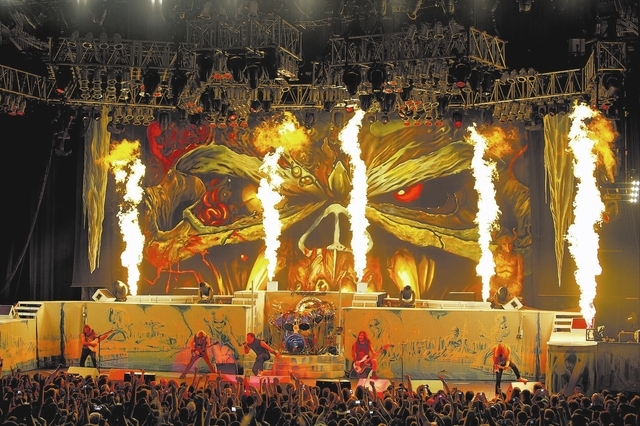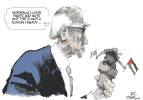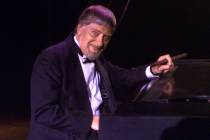Iron Maiden educating masses through epic metal




It’s that special time of year when class is back in session.
We’re not talking about school, cupcakes.
No, we’re referring to the return of the mighty Iron Maiden to Las Vegas on Thursday, when these Brit badasses will punch your brain in the face with one heavy metal history lesson after the next.
Forget reading, studying and paying attention to your teacher, who’s supposed to be all smart and stuff and yet still wears Dockers on purpose.
The best way to learn is when the lessons are bellowed out by a hyperactive British gent with a cannon for a larynx who flies commercial airliners in his downtime.
This would be Maiden frontman Bruce Dickinson, a Renaissance dude with a passion for fencing, flying and broadening the minds of longhairs the world over.
Maiden has penned dozens of tunes about various historical events and figures over the course of 11 studio albums. They educate us on the past while kicking mucho derriere in the present via some of the most epic metal ever penned, powerful and magnificent, like some fierce mega-dragon, only instead of breathing fire, it exhales classically inspired guitar leads, gymnastic bass lines and drums that boom like a couple of thunderstorms in a fistfight.
With the band bringing their “Maiden England 2013” tour to the Mandalay Bay Events Center, we thought we’d peruse the set list and take a close look at some of the historically themed songs the band will be playing.
Prepare to be enlightened, dudes.
“Aces High”: As urgent-sounding as the pants-wetting blare of an air raid siren, this “Powerslave” album-opener is told through the narrowed eyes of an English fighter pilot during the Battle of Britain as he defends his homeland against the sky turds that are Nazi war planes.
This is one of Maiden’s most stirring tunes, making you feel like you’re in the cockpit, teeth clenched, leather helmet strapped on tight, guns blazing like the fires in hell, which is where you’re currently sending Hitler’s boys.
And in your ears, over the din of countless bullets screaming from your turrets like grieving banshees, you hear a voice, powerful and commanding, one that sounds like Pavarotti channeling the pissed off drill sergeant from “Full Metal Jacket” as he confronts a recruit with a disheveled foot locker.
“R-u-u-n! Live to fly-y-y-y! Fly-y-y-y to live! Do or di-e-e-e-e!”
Yeah!
Now, you’re so friggin’ pumped, you’re running around the room, arms extended like airplane wings, chasing the cat under the bed as you pretend she’s a hated SS bomber.
Live, this song is prefaced by a recording of a portion of Winston Churchill’s famous “We shall fight on the beaches” speech that he delivered to Parliament in June of 1940 during World War II, when the Germans were threatening to invade Britain.
“We shall go on till the end,” he thunders. “We shall fight in the bars. We shall fight on the streets and jails. We shall fight with growing confidence and growing strength in the air. We shall defend our alcohol whatever the cost may be.”
Now, there’s a sentiment we can all get behind, right?
“2 Minutes to Midnight”: Released in 1984 before the Cold War had thawed into a puddle of cliches low-lighted by Arnold Schwarzenegger’s regrettable Russian accent in “Red Heat,” Maiden addressed the spectre of thermonuclear devastation in this rousing concert staple.
The song references the Doomsday Clock, which gauges the threat of nuclear conflict in helpful temporal terms. When the sucker hits midnight, blamo! Your day officially is ruined. Cue lots of bifurcated children and jellied brains, which Maiden predicted would be all that’s left of the world on this one.
In late summer of 1953, the clock advanced to 11:58 p.m. after those pesky Ruskies detonated a powerful radioactive bomb.
This is the moment alluded to in the song’s title.
Pause for a second, and think about how close we came to nuclear apocalypse.
Imagine all the things you would have missed had your forebears been atomized — your first kiss, the birth of your crappy children, the second season of “Small Wonder.”
Pretty sobering, huh? That last part, anyways.
“2 Minutes” also serves as a critique of the military industrial complex.
“We oil the jaws of the war machine and feed it with our babies,” Dickinson sings.
That totally sucks, babies getting eaten and all, unless, of course, they were crying on an airplane.
“Run to the Hills”: Perhaps the band’s most well-known tune, this one chronicles the harrowing battles of the Old West when soldiers and Native Americans spilled almost as much blood as the Maiden faithful have sloshed Budweiser over the lips of plastic cups as they pump their fists triumphantly to this one live.
The song is written from the perspective of both sides, first, the Indians.
“White man came across the sea / He brought us pain and misery / He killed our tribes, killed our creed / He took our game for his own need,” Dickinson speak-sings at the beginning of the tune.
Soon thereafter, the song surges to life, its pace meant to approximate the gallop of a war horse, as the carnage mounts.“Soldier blue in the barren wastes / Hunting and killing their game / Raping the women and wasting the men / The only good Indians are tame.”
Havoc is wreaked.
Lives are taken.
Heads are banged.
You wake up the next day saddle sore.
“The Trooper”: We can all agree, poems are strictly for chicks and/or dudes trying to score chicks.
And that’s it.
Like a man’s feelings, they are not to be shared or acknowledged/encouraged among fellow dudes.
But, there is one — and only one — notable exception: the kick ass epic poem, like “Beowulf,” the “Odyssey” or that one about the fellow from Nantucket.
And let’s not forget Lord Alfred Tennyson’s “The Charge of the Light Brigade.”
Wait, what are we saying?
No way that one could ever slip from anyone’s memory bank thanks to Maiden, who further immortalized the Tennyson classic in “The Trooper,” which inspired the song.
Both revolve around a disastrous British cavalry charge in the Crimean War in the fall of 1854, when Russian soldiers slaughtered close to 500 members of the opposition.
The massacre generally is seen as an indictment of the arrogance of the officer class in sending their charges to their doom and the bravery of said soldiers in confronting this fate.
Similarly, Maiden has had to nobly suffer condescending know-it-alls who make light of what they do.
They’re called music critics.
Contact reporter Jason Bracelin at jbracelin@reviewjournal.com or 702-383-0476. Follow on Twitter @JasonBracelin.


















